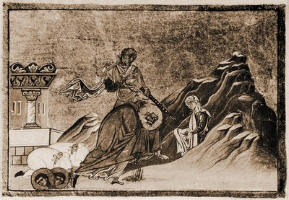
The Works Of Dionysius The Areopagite Volumes 1 & 2
SECTION I
The elementary teaching, then, of this the perfecting service, through the things done over the Divine Muron, shews this, in my judgment, that, that which is holy and of sweet savour in the minds of devout men is covered, as with a veil, since it Divinely enjoins upon holy men to have their beautiful and well-savoured assimilations in virtue to the hidden God not seen for vain glory. For the hidden comeliness of God is unsullied, and is sweet beyond conception, and manifested for spiritual contemplation to the intellectual alone, through a desire to have the unsullied images of virtue in souls of the same pattern. For by looking away from the undistorted and well imitated image of the Godlike virtue to that contemplated and fragrant beauty, he thus moulds and fashions it to the most beautiful imitation. And, as in the case of sensible images, if the artist look without distraction upon the archetypal form, not distracted by sight of anything else, or in any way divided in attention, he will duplicate, if I may so speak, the very person that is being sketched, whoever he may be, and will shew the reality in the likeness, and the archetype in the image, and each in each, save the difference of substance; thus, to copyists who love the beautiful in mind, the persistent and unflinching contemplation of the sweet-savoured and hidden beauty will confer the unerring and most Godlike appearance. Naturally, then, the divine copyists, who unflinchingly mould their own intellectual contemplation to the superessentially sweet and contemplated comeliness, do none of their divinely imitated virtues “to be seen of men,” as the Divine text expresses it; but reverently gaze upon the most holy things of the Church, veiled in the Divine Muron as in a figure. Wherefore, these also, by religiously concealing that which is holy and most Divine in virtue within their Godlike and God-engraved mind, look away to the archetypal conception alone; for not only are they blind to things dissimilar, but neither are they drawn down to gaze upon them. Wherefore, as becomes their character, they do neither love things, merely seeming good and just, but those really being such; nor do they look to opinion, upon which the multitude irrationally congratulate themselves, but, after the Divine example, by distinguishing the good or evil as it is in itself, they are Divine images of the most supremely Divine sweetness, which, having the truly sweet within itself, is not turned to the anomalously seeming of the multitude, moulding Its genuineness to the true images of Itself.

 Keep Site Running
Keep Site Running